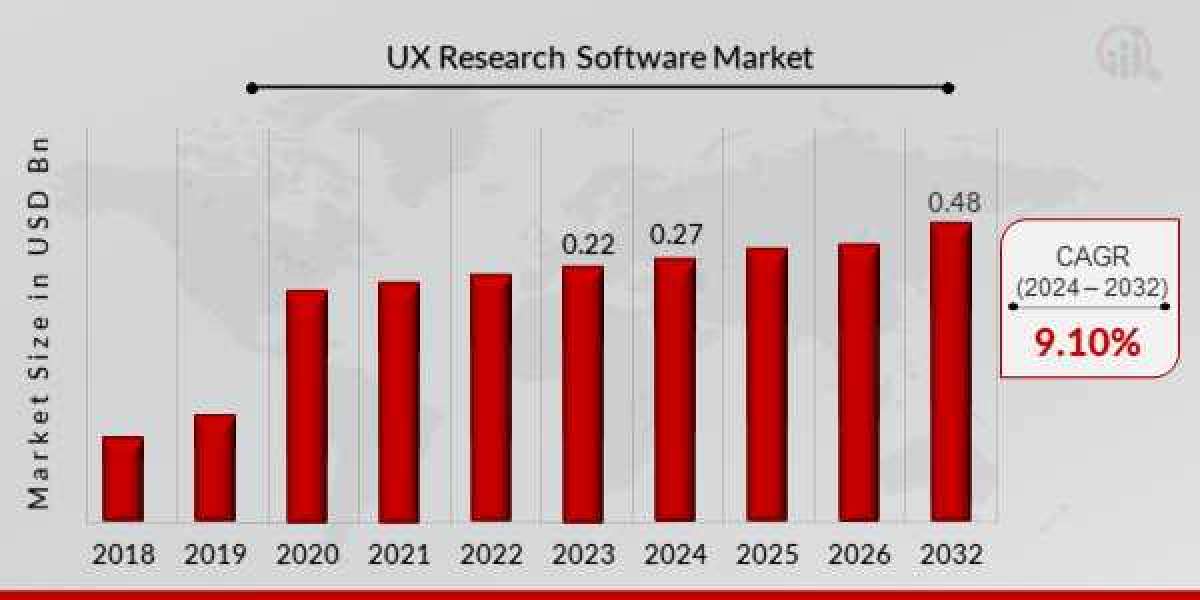Market Overview
The User Experience (UX) Research Software Market has seen remarkable growth over the past few years, driven by the increasing importance of user-centric design in product development. UX research software provides tools and platforms that enable companies to understand user behavior, preferences, and pain points. This understanding helps businesses design better products, enhance user satisfaction, and improve overall usability. The global UX research software market is poised for continued expansion, propelled by the rising demand for seamless user experiences and the integration of advanced technologies such as artificial intelligence and machine learning. The UX Research Software Market is projected to grow from USD 0.27 billion in 2024 to USD 0.48 billion by 2032, exhibiting a compound annual growth rate (CAGR) of 9.10% during the forecast period (2024 - 2032).
Request To Free Sample of This Strategic Report - https://www.marketresearchfuture.com/sample_request/10405
Key Market Segments
The UX research software market can be segmented based on type, deployment mode, application, and region.
By Type:
- Usability Testing Software: Tools that allow for testing the usability of a product, identifying issues, and collecting feedback from users.
- Heatmap Software: Visual representation tools that show where users click, scroll, and move on a webpage.
- A/B Testing Software: Platforms that facilitate comparing two versions of a webpage or app to determine which performs better.
- Survey and Feedback Software: Tools for collecting user feedback through surveys, polls, and questionnaires.
By Deployment Mode:
- Cloud-Based: Solutions that are hosted on the cloud, offering flexibility, scalability, and accessibility from any location.
- On-Premises: Software that is installed and run on local servers, providing greater control and security.
By Application:
- Large Enterprises: Organizations with extensive resources and complex UX research needs.
- Small and Medium Enterprises (SMEs): Businesses that require cost-effective and scalable UX research solutions.
By Region:
- North America: Dominant market with high adoption of advanced UX research tools.
- Europe: Strong focus on user-centric design and increasing investment in UX research.
- Asia-Pacific: Rapid growth due to the booming e-commerce industry and rising awareness of UX importance.
- Latin America: Emerging market with growing interest in improving user experiences.
- Middle East and Africa: Adoption driven by digital transformation initiatives and growing internet penetration.
Industry Latest News
The UX research software market is dynamic, with frequent advancements and innovations shaping its trajectory. Recent developments highlight the industry's growth and potential:
Integration of AI and Machine Learning: Companies are increasingly integrating AI and machine learning capabilities into UX research software to analyze large datasets, predict user behavior, and provide actionable insights.
Rise of Remote Usability Testing: The shift towards remote work and the need for flexible testing solutions have led to a surge in demand for remote usability testing tools, allowing researchers to conduct studies with participants from diverse locations.
Enhanced Data Privacy Measures: With growing concerns over data privacy, UX research software providers are implementing stringent security protocols to protect user data and comply with regulations like GDPR and CCPA.
Collaboration Features: Modern UX research tools are incorporating collaboration features, enabling teams to work together seamlessly, share insights, and make data-driven decisions.
Expanding Market for SMEs: The increasing availability of affordable and user-friendly UX research solutions is driving adoption among small and medium enterprises, democratizing access to advanced research tools.
Key Companies
Several key players dominate the UX research software market, each contributing to the industry's growth through innovation and strategic initiatives:
UserTesting: A leading provider of on-demand human insights, UserTesting offers a comprehensive platform for usability testing, user interviews, and feedback collection.
Lookback: Lookback specializes in remote usability testing and user research, offering tools for live interviews, session recordings, and collaborative analysis.
Hotjar: Hotjar provides heatmap, session recording, and survey tools, helping businesses understand user behavior and improve website performance.
Optimal Workshop: Known for its suite of tools for information architecture and usability testing, Optimal Workshop helps organizations enhance their digital experiences.
Usabilla (SurveyMonkey): Usabilla, a part of SurveyMonkey, offers feedback collection and analysis tools, enabling businesses to gather real-time user insights.
Morae (TechSmith): Morae by TechSmith is a popular choice for usability testing, providing recording and analysis capabilities for user research sessions.
UserZoom: UserZoom offers a comprehensive UX research platform, including usability testing, surveys, and benchmarking tools, catering to both large enterprises and SMEs.
Market Drivers
Several factors are driving the growth of the UX research software market:
Increasing Emphasis on User-Centric Design: As businesses recognize the importance of user experience in product success, there is a growing demand for tools that facilitate user research and usability testing.
Digital Transformation: The ongoing digital transformation across industries is pushing companies to invest in UX research to enhance their digital offerings and stay competitive.
Proliferation of Mobile Devices: The widespread use of smartphones and tablets has heightened the need for mobile-friendly UX research tools that can help optimize experiences across various devices.
Advancements in Technology: Continuous advancements in AI, machine learning, and data analytics are enhancing the capabilities of UX research software, making it more efficient and effective.
Growing Competition: In an increasingly competitive market, businesses are striving to differentiate themselves by delivering superior user experiences, driving the adoption of UX research tools.
Ask for Customization - https://www.marketresearchfuture.com/ask_for_customize/10405
Regional Insights
North America: North America leads the UX research software market, driven by high technology adoption rates, strong focus on user-centric design, and substantial investment in digital transformation initiatives. The presence of major tech companies and UX research firms further supports market growth.
Europe: Europe is witnessing robust growth in the UX research software market, with a strong emphasis on data privacy and compliance. Countries like Germany, the UK, and France are leading the adoption of advanced UX research tools to enhance digital experiences.
Asia-Pacific: The Asia-Pacific region is experiencing rapid growth, fueled by the booming e-commerce industry, rising internet penetration, and increasing awareness of the importance of user experience. Countries like China, India, and Japan are at the forefront of UX research adoption.
Latin America: Latin America is an emerging market for UX research software, with growing interest in improving user experiences and increasing investment in digital initiatives. Brazil and Mexico are key contributors to market expansion.
Middle East and Africa: The adoption of UX research software in the Middle East and Africa is driven by digital transformation efforts and the growing importance of online services. The region's diverse market dynamics and increasing internet usage support market growth.
User Experience Software Market Highlights:








